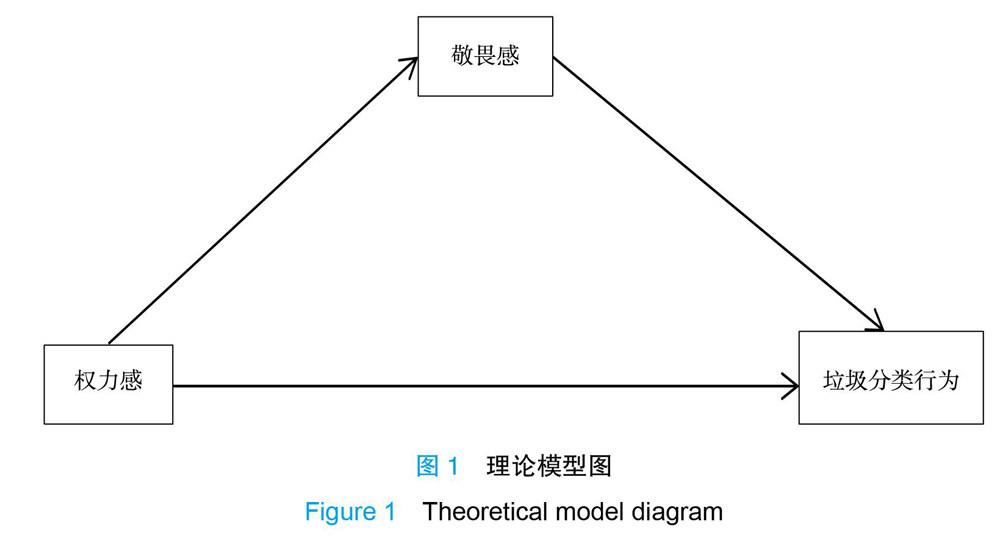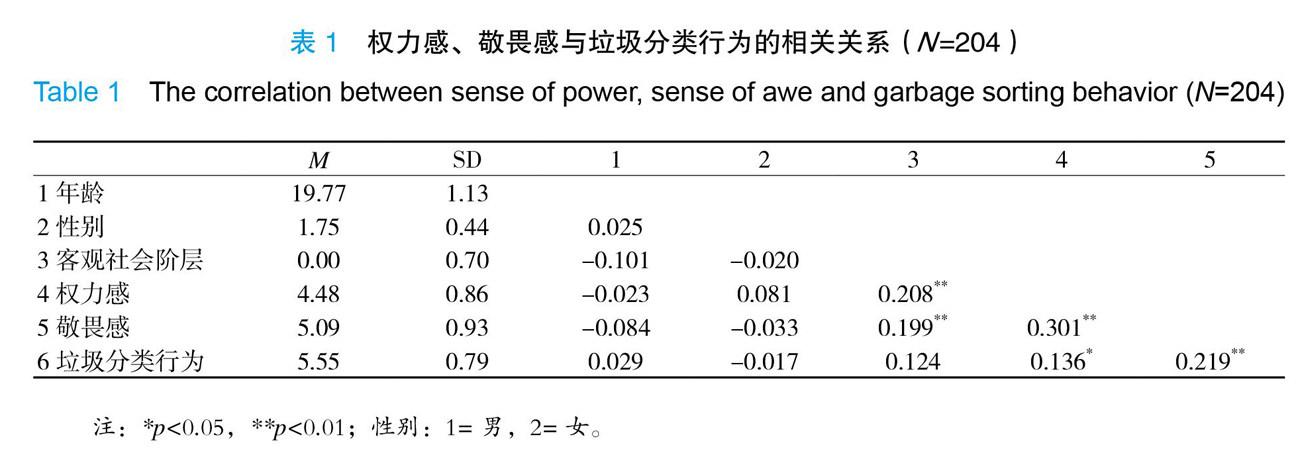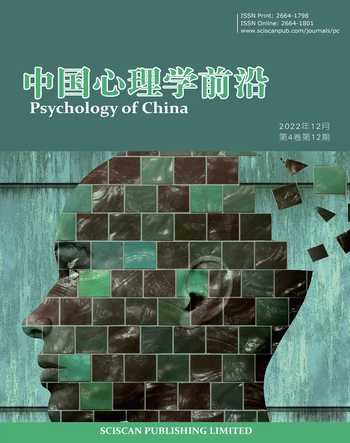位高者有所畏?权力感对垃圾分类行为的影响
孙海龙 王嘉仪 陈玉 刘便荣



摘 要|权力感如何影响垃圾分类这类亲环境行为是实践界和理论界均关注的重要研究问题。基于社会比较理论, 本研究构建权力感影响垃圾分类行为的理论模型。通过问卷调查研究,结果发现:(1)权力感正向影响垃圾分类行为,个体感知权力感越高,越倾向进行垃圾分类行为;(2)权力感显著正向预测个体的敬畏感程 度;(3)权力感通过心理敬畏感影响垃圾分类行为。具体而言,权力感越高的个体,越具有较高的敬畏感,进一步,敬畏感的提升促进个体更倾向进行垃圾分类这类亲环境行为。本研究整合的理论框架为解释权 力感对垃圾分类行为的影响提供了更全面的解释,这不仅丰富了权力相关的文献,拓展了社会比较理论在垃 圾分类等亲环境行为领域的应用,同时也为如何助推个体垃圾分类提供了实践启示。
关键词|权力感;敬畏感;垃圾分类行为;社会比较理论
Copyright ? 2022 by author (s) and SciScan Publishing Limited
This article is licensed under a Creative Commons Attribution-NonCommercial 4.0 International License. https://creativecommons.org/licenses/by-nc/4.0/
1 引言
近年来,伴随经济快速发展,垃圾问题日益凸显,已成为全球十大环境问题之一。面对愈加严重的垃圾问题,垃圾分类行为对于实现垃圾无害化、减量化和资源化具有重要作用。然而,与垃圾分类重要性相悖,根据生态环境部数据显示:中国生活垃圾总量持续增长,2017 年已达到约 2.15 亿吨,仅广东省一年内共填埋 1625.8 万吨垃圾,垃圾分类回收率不足 30%。如何促进人们进行垃圾分类、减少环境污染日益成为社会学、心理学及管理学共同关注的问题(Gifford and Nilsson,2014;Kolodko and Read, 2018)。
过往垃圾分类的研究聚焦于可能的环境因素,从客观环境可达性、吸引性和可视性方面探讨了垃圾桶的数量和位置(Kallgren et al.,2000)、环境的整洁度对环保行为的影响。例如有研究指出指导具体化有利于人们减少乱扔垃圾的行为(Kolodko and Read,2018)。也有研究从个体知识、环保价值观、环境态度等方面探讨对环保行为的影响( Liobikiene and Juknys,2016;Montano et al.,2008)。然而,垃圾分类行为不仅受上述因素影响,它还明显受到社会关系因素影响,例如,作为人与人之间一种特殊影响力的权力感,影响着人们的思维方式和社会活动。那么,权力感对垃圾分类行为有何影响?其内在的心理机制如何?上述问题亟待解决。
因此,基于社会比较理论,本研究拟建构权力感影响垃圾分类行为的理论模型,探讨权力感对垃圾分类行为的影响机制。研究为后续垃圾分类行为研究提供新的方向,同时有助于我们更加全面、客观地看待不同权力感个体的环保行为,为我国社会治理提供合理有效的建议。
2 理论基础与研究假设
权力感与敬畏的关系
权力是指个体可以控制、影响他人的能力(Anderson and Galinsky,2006),其不仅具有社会结构属性(真实的社会关系中的权力结构),而且具有心理属性。换言之,一个人无须真实地处于拥有权力的社会结构情境中,同样可能感知到拥有权力的心理体验。将上述这种个体对自身资源能够影响和控制他人、无须依赖他人能力的主观感知称之为权力感(Tost and Plunkett L,2015)。已有研究表明权力感水平的高低影响个体的心理与行为过程。然而不同于早期权力感相关研究认为高权力感者倾向于与他人保持距离(Lammers et al.,2012),更加倾向物化他人(Lammers and Stapel,2011)。近年来,越来越多的研究表明高权力感具有积极作用,例如,德威特等(2017)的研究中发现高权力感个体更善于听取他人的建议(De Wit et al.,2017)。
根据社会比较理论,人们常常通过与他人态度、能力、观点、结果等方面的对比来评价自身的处境和地位。它会影响人们对自我的认知、评价,影响人们的情绪反应,也会对人们的行为产生不同的影响。我们认为相较于低权力感个体,高权力感个体掌握着更多的珍贵资源,会产生能动导向,使得个体更关注自我表达、提升和保护(Rucker et al.,2012)。进一步,这种自我表达提升的需要,使得高权力感个体相比于低权力感个体更可能进行上行比较,引发自我超越性情绪(Hu et al.,2018),以最终达到自我提升的目的。
与自我超越情绪内涵相一致,敬畏即是一种包含自我超越情绪的复杂情绪状态。一方面从认知机 制层面来看,高权力感个体的社会距离感知更大,解释水平也就更高,心理表征也就更抽象(Magee et al.,2010)。已有研究表明抽象的心理表征更易产生敬畏感的核心特征——浩大感(Prade and Saroglou, 2016)。另一方面,相比于低权力感个体,高权力个体具有更加灵活的信息加工方式,较少受到资源限制,更易进行上行比较。高权力感个体往往采取积极主动行为,与个人成就、自然界事物进行上行比较, 进而引发敬畏感,并伴随相应的小我感。据此,我们提出假设 1。
假设 1:权力感正向预测个体的敬畏感。
敬畏感与垃圾分类行为的关系
敬畏是人们面临浩瀚的事物,并且超越自己目前认知范围的事物时产生的惊异、敬佩和恐惧的复杂情绪体验。一般认为敬畏感属于一种积极的道德情绪范畴,具有亲社会性的益处。根据社会比较理论和敬畏的相关研究,发现在个体体验到敬畏情绪时,其注意力开始从自我转移到外界,自我利益和自我需求减弱,变得更注重他人和集体利益。早年研究发现,敬畏会增加个体对所属群体的积极性,增强团体凝聚力,使个体产生更强烈的忠诚和奉献的意愿(Shiota,Keltner,and Mossman,2007)。近年来,越来越多的研究发现,敬畏可以促进对未知他人的亲社会态度和行为(Prade and Saroglou,2016),促进绿色消费(Wang et al.,2019)和个体的亲环境行为(孙颖 等,2020)。
[9]Keltner D,Gruenfeld D H,Anderson C.Power,approach,and inhibition[J].Psychological Review,2003,110(2):265.
[10]Kolodko J,Read D.Using behavioral science to reduce littering:Understanding,addressing and solving the problem of litter[J].Journal of Litter and Environmental Quality,2018,2(1):21-36.
[11]Lammers J,Stapel D A.Power increases dehumanization[J].Group Processes and Intergroup Relations, 2011,14(1):113-126.
[12]Lammers J,Galinsky A D,Gordijn E H,et al.Power increases social distance[J].Social Psychological and Personality Science,20112,3(3):282-290.
[13]Liobikien? G,Juknys R.The role of values,environmental risk perception,awareness of consequences,and willingness to assume responsibility for environmentally-friendly behaviour:The Lithuanian case[J].Journal of Cleaner Production,2016(112):3413-3422.
[14]Magee J C,Smith P K.The social distance theory of power[J].Personality and Social Psychology Review, 2013,17(2):158-186.
[15]Prade C,Saroglou V.Awes effects on generosity and helping[J].The Journal of Positive Psychology, 2016,11(5):522-530.
[16]Piff P K,Kraus M W,C?té S,et al.Having less,giving more:The influence of social class on prosocial behavior[J].Journal of Personality and Social Psychology,2010,99(5):771.
[17]Preacher K J,Hayes A F.SPSS and SAS procedures for estimating indirect effects in simple mediation models
[J].Behavior Research Methods,Instruments,Computers,2004,36(4):717-731.
[18]Rieskamp J,Todd P M.The evolution of cooperative strategies for asymmetric social interactions[J].Theory and Decision,2006,60(1):69-111.
[19]Razmerita L,Kirchner K,Nielsen P.What factors influence knowledge sharing in organizations? A social dilemma perspective of social media communication[J].Journal of knowledge Management,2016,20
(6):1225-1246.
[20]Salancik G R,Pfeffer J.A social information processing approach to job attitudes and task design[J]. Administrative Science Quarterly,1978,23(2):224-253.
[21]Shiota M N,Keltner D,John O P.Positive emotion dispositions differentially associated with Big Five personality and attachment style[J].The Journal of Positive Psychology,2006,1(2):61-71.
[22]Shiota M N,Keltner D,Mossman A.The nature of awe:Elicitors,appraisals,and effects on self-concept
[J].Cognition and Emotion,2007,21(5):944-963.
[23]Sun H L,Li A M,Li B,et al.Pain is forgotten where gain follows:The masking effect of positive outcomes on emotional suffering[J].Asian Journal of Social Psychology,2018,21(3):178-186.
[24]Tost,Plunkett L.When,why,and how do power holders “feel the power”? Examining the links between structural and psychological power and reviving the connection between power and responsibility[J].Research in Organizational Behavior,2015(35):29-56.
[25]Van Lange P A,Joireman J,Parks C D,et al.The psychology of social dilemmas:A review[J]. Organizational Behavior and Human Decision Processes,2013,120(2):125-141.
[26]Wang L,Zhang G,Shi P,et al.Influence of awe on green consumption:The mediating effect of psychological ownership[J].Frontiers in Psychology,2019(10):2484.
[27]Zhao Y,Chen R,Yabe M,et al.I am better than others:Waste management policies and self-enhancement bias[J].Sustainability,2021( 13):13257.
Too High to Awe? The Influence of Power on Garbage Sorting Behavior
Sun Hailong1 Wang Jiayi1 Chen Yu1 Liu Bianrong2
1. School of Business, Guagndong Unviersity of Foreign Studies, Guangzhou; 2.Guangxi Vocational College of Technology and Business, Nanning
Abstract: How the sense of power affects garbage sorting is an important research issue in practice. Based on the theory of social comparison, a theoretical model of power sense affecting garbage sorting behavior is constructed. Through the questionnaire survey, the results found that: (1) The sense of power positively affects garbage sorting behavior. The higher the sense of power, the more inclined one is to engage in garbage sorting behavior; (2) The sense of power can positively predict an individuals sense of awe;
(3) The sense of power affects garbage classification behavior through the sense of awe. Specifically, the sense of power helps to improve the individuals sense of awe, and then awe increases to promote a higher tendency toward garbage sorting behavior. The theoretical framework integrated in this study provides a more comprehensive explanation of the influence of power on garbage sorting behavior, which not only enriches the power-related literature and expands the application of social comparative theory in pro- environmental behaviors such as garbage sorting but also provides practical enlightenment for how to boost individual garbage classification.
Key words: Sense of power; Sense of awe; Garbage sorting behavior; Ocial comparison theory

